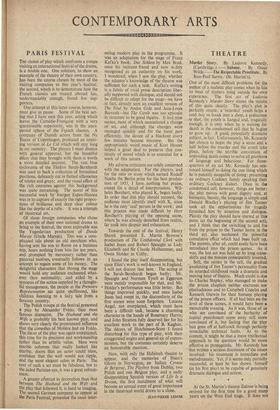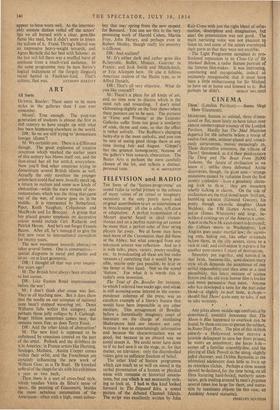THEATRE
ONE of the most difficult problems for the author of a realistic play comes when he has to treat of matters lying outside his own experience. The first act of Ludovic Kennedy's Murder Story shows the results of this quite clearly. The play's plot is perfectly simple: a 'retarded' youth helps a cosh boy to break into a shop, a policeman is shot, the youth is hanged and, tragically enough, it is only when he is waiting for death in the condemned cell that he begins to grow up. A good, potentially dramatic subject, in fact. Unfortunately, Mr. Kennedy has chosen to begin the play a scene and a half before the murder and the arrest take place, before the terrible convention of impending death comes to-solve all problems of language and behaviour. For three- quarters of an act Mr. Kennedy has sen- tenced himself to doing the one thing which he is patently incapable of doing: presenting an ordinary Cockney family speaking their ordinary Cockney dialect. Once in the condemned cell, however, things are better: the play moves with great dignity and, at moments, beauty, the language is simple and Donald Bradley's playing of Jim Tanner took all the opportunities for tragedy furnished him by situation and dialogue. Plainly the play should have started at this point (at the beginning of the second act), and I think that the switching to and fro from the prison to the Tanner home in the third act also weakened the powerful cumulative effect which had been built up. The parents, after all, could easily have been introduced into the prison scenes. As it was, the last act was held up by long scene- shifts and the tension consequently lowered.
Still, the scenes in the cell, the gradual awakening of Jim Tanner's personality from its retarded childhood made a dramatic and moving hour of theatre. Much credit is duo to Charles Stanley, who managed to make the prison chaplain neither unctuous nor platitudinous and to Campbell Copelin and Kenneth Outwin for their humane playing of the prison officers. Hall had been en the level of these scenes, it would have been a memorable evening. As it was, those of us who are convinced of the barbarity of capital punishment came away still more convinced of it, but feeling that the play had gone off at half-cock through perfectly remediable technical faults. As to the content, it might be that a more intellectual approach to the question would be more effective as propaganda. Mr. Kennedy has not written a serious discussion of the issues involved: his treatment is immediate and melodramatic. Yet, if it seems only partially successful, at least he has shown himself (in his first play) to be capable of genuinely dramatic dialogue and action.
At the St. Martin's theatre Salome is being revived for the first time for a good many years on the West End stage. It does not appear to have worn well. As the intermin- ably aureate diction rolled off the actors' lips we all burned with a clear, gem-like flame like mad, but it didn't seem to lessen the tedium of it. Frank Thring's Herod was an impressive heavy-weight tetrarch, and Agnes BerneIle did her best with Salome: as the last veil fell there was a muffled burst of applause from a much-tried audience. In the same programme may be seen Sartre's logical indictment of the (largely illogical) racial hatred in Faulkner-land. That's



































 Previous page
Previous page